- Home
- Stephen R. Donaldson
The Wounded Land t2cotc-1
The Wounded Land t2cotc-1 Read online
The Wounded Land
( The 2st Chronicles of Thomas Covenant - 1 )
Stephen R. Donaldson
Four thousand years have passed since Covenant first freed the Land from the devastating grip of Lord Foul and his minions. But he is back, and Convenant, armed with his stunning white gold magic, must battle the evil forces and his own despair…
The Wounded Land
The Second Chronicles of Thomas Covenant — 1
GALLOW-FELLS
Prologue. Choice
One: Daughter
WHEN Linden Avery heard the knock at her door, she groaned aloud. She was in a black mood, and did not want visitors. She wanted a cold shower and privacy-a chance to accustom herself to the deliberate austerity of her surroundings.
She had spent most of the afternoon of an unnaturally muggy day in the middle of spring moving herself into this apartment which the Hospital had rented for her, lugging her sparse wardrobe, her inadequate furniture, and a back-breaking series of cardboard boxes containing textbooks from her middle-aged sedan up the outside stairs to the second floor of the old wooden house. The house squatted among its weeds like a crippled toad, spavined by antiquity; and when she had unlocked her apartment for the first time, she had been greeted by three rooms and a bath with grubby yellow walls, floorboards covered only by chipped beige paint, an atmosphere of desuetude bordering on indignity-and by a piece of paper which must have been slipped under the door. Thick red lines like lipstick or fresh blood marked the paper-a large crude triangle with two words inside it:
JESUS SAVES
She had glared at the paper for a moment, then had crumpled it in her pocket. She had no use for offers of salvation. She wanted nothing she did not earn.
But the note, combined with the turgid air, the long exertion of heaving her belongings up the stairs, and the apartment itself, left her feeling capable of murder. The rooms reminded her of her parents' house. That was why she hated the apartment. But it was condign, and she chose to accept it. She both loathed and approved the aptness of her state. Its personal stringency was appropriate.
She was a doctor newly out of residency, and she had purposely sought a job which would bring her to a small half-rural, half-stagnant town like this one-a town like the one near which she had been born and her parents had died. Though she was only thirty, she felt old, unlovely, and severe. This was just; she had lived an unlovely and severe life. Her father had died when she was eight; her mother, when she was fifteen. After three empty years in a foster home, she had put herself through college, then medical school, internship, and residency, specializing in Family Practice. She had been lonely ever since she could remember, and her isolation had largely become ingrained. Her two or three love affairs had been like hygienic exercises or experiments in physiology; they had left her untouched. So now when she looked at herself, she saw severity, and the consequences of violence.
Hard work and clenched emotions had not hurt the gratuitous womanliness of her body, or dulled the essential lustre of her shoulder-length wheaten hair, or harmed the structural beauty of her face. Her driven and self-contained life had not changed the way her eyes misted and ran almost without provocation. But lines had already marked her face, leaving her with a perpetual frown of concentration above the bridge of her straight, delicate nose, and gullies like the implications of pain on either side of her mouth-a mouth which had originally been formed for something more generous than the life which had befallen her. And her voice had become flat, so that it sounded more like a diagnostic tool, a way of eliciting pertinent data, than a vehicle for communication.
But the way she had lived her life had given her something more than loneliness and a liability to black moods. It had taught her to believe in her own strength. She was a physician; she had held life and death in her hands, and had learned how to grasp them effectively. She trusted her ability to carry burdens. When she heard the knock at her door, she groaned aloud. But then she straightened her sweat-marked clothes as if she were tugging her emotions into order, and went to open the door.
She recognized the short, wry man who stood on the landing. He was Julius Berenford, Chief of Staff of the County Hospital.
He was the man who had hired her to run his Outpatient Clinic and Emergency Room. In a more metropolitan hospital, the hiring of a Family Practitioner for such a position would have been unusual. But the County Hospital served a region composed largely of farmers and hill people. This town, the county seat, had been calcifying steadily for twenty years. Dr. Berenford needed a generalist.
The top of his head was level with her eyes, and he was twice her age. The round bulge of his stomach belied the thinness of his limbs. He gave an impression of dyspeptic affection, as if he found human behaviour both incomprehensible and endearing. When he smiled below his white moustache, the pouches under his eyes tightened ironically.
“Dr. Avery,” he said, wheezing faintly after the exertion of the stairs.
“Dr. Berenford.” She wanted to protest the intrusion; so she stepped aside and said tightly, “Come in.”
He entered the apartment, glancing around as he wandered toward a chair. “You've already moved in,” he observed. “Good. I hope you had help getting everything up here.”
She took a chair near his, seated herself squarely, as if she were on duty. “No.” Who could she have asked for help?
Dr. Berenford started to expostulate. She stopped him with a gesture of dismissal. “No problem. I'm used to it.”
“Well, you shouldn't be.” His gaze on her was complex. “You just finished your residency at a highly respected hospital, and your work was excellent. The least you should be able to expect in life is help carrying your furniture upstairs.”
His tone was only half humorous; but she understood the seriousness behind it because the question had come up more than once during their interviews. He had asked repeatedly why someone with her credentials wanted a job in a poor county hospital. He had not accepted the glib answers she had prepared for him; eventually, she had been forced to offer him at least an approximation of the facts. “Both my parents died near a town like this,” she had said. “They were hardly middle-aged. If they'd been under the care of a good Family Practitioner, they would be alive today.”
This was both true and false, and it lay at the root of the ambivalence which made her feel old. If her mother's melanoma had been properly diagnosed in time, it could have been treated surgically with a ninety per cent chance of success. And if her father's depression had been observed by anybody with any knowledge or insight, his suicide might have been prevented. But the reverse was true as well; nothing could have saved her parents. They had died because they were simply too ineffectual to go on living. Whenever she thought about such things, she seemed to feel her bones growing more brittle by the hour.
She had come to this town because she wanted to try to help people like her parents. And because she wanted to prove that she could be effective under such circumstances-that she was not like her parents. And because she wanted to die.
When she did not speak, Dr. Berenford said, “However, that's neither here nor there.” The humorlessness of her silence appeared to discomfit him. “I'm glad you're here. Is there anything I can do? Help you get settled?”
Linden was about to refuse his offer, out of habit if not conviction, when she remembered the piece of paper in her pocket. On an impulse, she dug it out, handed it to him. “This came under the door. Maybe you ought to tell me what I'm getting into.”
He peered at the triangle and the writing, muttered, “Jesus saves,” under his breath, then sighed. “Occupational hazard. I've been going to church faithfully in this town for
forty years. But since I'm a trained professional who earns a decent living, some of our good people-” He grimaced wryly, “-are always trying to convert me. Ignorance is the only form of innocence they understand.” He shrugged, returned the note to her. “This area has been depressed for a long time. After a while, depressed people do strange things. They try to turn depression into a virtue — they need something to make themselves feel less helpless. What they usually do around here is become evangelical. I'm afraid you're just going to have to put up with people who worry about your soul. Nobody gets much privacy in a small town.”
Linden nodded; but she hardly heard her visitor. She was trapped in a sudden memory of her mother, weeping with poignant self-pity. She had blamed Linden for her father's death-
With a scowl, she drove back the recollection. Her revulsion was so strong that she might have consented to having the memories physically cut out of her brain. But Dr. Berenford was watching her as if her abhorrence showed on her face. To avoid exposing herself, she pulled discipline over her features like a surgical mask. “What can I do for you, doctor?”
“Well, for one thing,” he said, forcing himself to sound genial in spite of her tone, “you can call me Julius. I'm going to call you Linden, so you might as well.”
She acquiesced with a shrug. “Julius.”
“Linden.” He smiled; but his smile did not soften his discomfort. After a moment, he said hurriedly, as if he were trying to outrun the difficulty of his purpose, “Actually, I came over for two reasons. Of course, I wanted to welcome you to town. But I could have done that later. The truth is, I want to put you to work.”
Work? she thought. The word sparked an involuntary protest. I just got here. I'm tired and angry, and I don't know how I'm going to stand this apartment. Carefully, she said, “It's Friday. I'm not supposed to start until Monday.”
“This doesn't have anything to do with the Hospital. It should, but it doesn't.” His gaze brushed her face like a touch of need. “It's a personal favour. I'm in over my head. I've spent so many years getting involved in the lives of my patients that I can't seem to make objective decisions anymore. Or maybe I'm just out of date-don't have enough medical knowledge. Seems to me that what I need is a second opinion.”
“About what?” she asked, striving to sound noncommittal. But she was groaning inwardly. She already knew that she would attempt to provide whatever he asked of her. He was appealing to a part of her that had never learned how to refuse.
He frowned sourly. “Unfortunately, I can't tell you. It's in confidence.”
“Oh, come on.” She was in no mood for guessing games. “I took the same oath you did.”
“I know.” He raised his hands as if to ward off her vexation. “I know. But it isn't exactly that kind of confidence.”
She stared at him, momentarily nonplussed. Wasn't he talking about a medical problem? “This sounds like it's going to be quite a favour.”
“Could be. That's up to you.” Before she could muster the words to ask him what he was talking about, Dr. Berenford said abruptly, “Have you ever heard of Thomas Covenant? He writes novels.”
She felt him watching her while she groped mentally. But she had no way of following his line of thought. She had not read a novel since she had finished her literature requirement in college. She had had so little time. Striving for detachment, she shook her head.
“He lives around here,” the doctor said. “Has a house outside town on an old property called Haven Farm. You turn right on Main.” He gestured vaguely toward the intersection. “Go through the middle of town, and about two miles later you'll come to it. On the right. He's a leper.”
At the word leper, her mind bifurcated. This was the result of her training-dedication which had made her a physician without resolving her attitude toward herself. She murmured inwardly, Hansen's disease, and began reviewing information.
Mycobacterium lepra. Leprosy. It progressed by killing nerve tissue, typically in the extremities and in the cornea of the eye. In most cases, the disease could be arrested by means of a comprehensive treatment program pivoting around DDS: diamino-diphenyl-sulfone. If not arrested, the degeneration could produce muscular atrophy and deformation, changes in skin pigmentation, blindness. It also left the victim subject to a host of secondary afflictions, the most common of which was infection that destroyed other tissues, leaving the victim with the appearance-and consequences-of having been eaten alive. Incidence was extremely rare; leprosy was not contagious in any usual sense. Perhaps the only statistically significant way to contract it was to suffer prolonged exposure as a child in the tropics under crowded and unsanitary living conditions.
But while one part of her brain unwound its skein of knowledge, another was tangled in questions and emotions. A leper? Here? Why tell me? She was torn between visceral distaste and empathy. The disease itself attracted and repelled her because it was incurable-as immedicable as death. She had to take a deep breath before she could ask, “What do you want me to do about it?”
“Well- ” He was studying her as if he thought there were indeed something she could do about it. “Nothing. That isn't why I brought it up.” Abruptly, he got to his feet, began measuring out his unease on the chipped floorboards. Though he was not heavy, they squeaked vaguely under him. “He was diagnosed early enough-only lost two fingers. One of our better lab technicians caught it, right here at County Hospital. He's been stable for more than nine years now. The only reason I told you is to find out if you're-squeamish. About lepers.” He spoke with a twisted expression. “I used to be. But I've had time to get over it.”
He did not give her a chance to reply. He went on as if he were confessing. “I've reached the point now where I don't think of him as leprosy personified. But I never forget he's a leper.” He was talking about something for which he had not been able to forgive himself. “Part of that's his fault,” he said defensively. “He never forgets, either. He doesn't think of himself as Thomas Covenant the writer-the man-the human being. He thinks of himself as Thomas Covenant the leper.”
When she continued to stare at him flatly, he dropped his gaze. “But that's not the point. The point is, would it bother you to go see him?”
“No,” she said severely; but her severity was for herself rather than for him. I'm a doctor. Sick people are my business. “But I still don't understand why you want me to go out there.”
The pouches under his eyes shook as if he were pleading with her. “I can't tell you.”
“You can't tell me.” The quietness of her tone belied the blackness of her mood. “What good do you think I can possibly do if I don't even know why I'm talking to him?”
“You could get him to tell you.” Dr. Berenford's voice sounded like the misery of an ineffectual old man. “That's what I want. I want him to accept you-tell you what's going on himself. So I won't have to break any promises.”
“Let me get this straight,” She made no more effort to conceal her anger. “You want me to go out there, and ask him outright to tell me his secrets. A total stranger arrives at his door, and wants to know what's bothering him-for no other reason than because Dr. Berenford would like a second opinion. I'll be lucky if he doesn't have me arrested for trespassing.”
For a moment, the doctor faced her sarcasm and indignation. Then he sighed. “I know. He's like that-he'd never tell you. He's been locked into himself so long-”The next instant, his voice became sharp with pain. “But I think he's wrong.”
“Then tell me what it is,” insisted Linden.
His mouth opened and shut; his hands made supplicating gestures. But then he recovered himself. "No. That's backward. First
I need to know which one of us is wrong. I owe him that. Mrs. Roman is no help. This is a medical decision. But I can't make it. I've tried, and I can't."
The simplicity with which he admitted his inadequacy snared her. She was tired, dirty, and bitter, and her mind searched for an escape. But his need for assistance struck t
oo close to the driving compulsions of her Me. Her hands were knotted together like certainty. After a moment, she looked up at him. His features had sagged as if the muscles were exhausted by the weight of his mortality. In her flat professional voice, she said, “Give me some excuse I can use to go out there.”
She could hardly bear the sight of his relief. “That I can do,” he said with a show of briskness. Reaching into a jacket pocket, he pulled out a paperback and handed it to her. The lettering across the drab cover said:
Or I Will Sell My Soul for Guilt
a novel by
THOMAS COVENANT
“Ask for his autograph.” The older man had regained his sense of irony. “Try to get him talking. If you can get inside his defences, something will happen.”
Silently, she cursed herself. She knew nothing about novels, had never learned how to talk to strangers about anything except their symptoms. Anticipations of embarrassment filled her like shame. But she had been mortifying herself for so long that she had no respect left for the parts of her which could still feel shame. “After I see him,” she said dully, “I'll want to talk to you. I don't have a phone yet. Where do you live?”
Her acceptance restored his earlier manner; he became wry and solicitous again. He gave her directions to his house, repeated his offer of help, thanked her for her willingness to involve herself in Thomas Covenant's affairs. When he left, she felt dimly astonished that he did not appear to resent the need which had forced him to display his futility in front of her.
And yet the sound of his feet descending the stairs gave her a sense of abandonment, as if she had been left to carry alone a burden that she would never be able to understand.
Foreboding nagged at her, but she ignored it. She had no acceptable alternatives. She sat where she was for a moment, glaring around the blind yellow walls, then went to take a shower.

 The Illearth War
The Illearth War Last Chronicles of Thomas Covenant 02 - Fatal Revenant
Last Chronicles of Thomas Covenant 02 - Fatal Revenant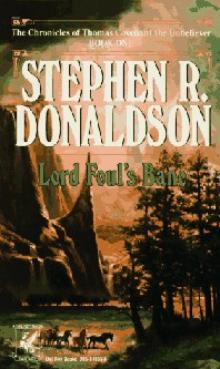 Lord Foul's Bane
Lord Foul's Bane The Gap Into Ruin: This Day All Gods Die
The Gap Into Ruin: This Day All Gods Die White Gold Wielder
White Gold Wielder Fatal Revenant
Fatal Revenant The Mirror of Her Dreams
The Mirror of Her Dreams Against All Things Ending
Against All Things Ending The Real Story: The Gap Into Conflict
The Real Story: The Gap Into Conflict The Power That Preserves
The Power That Preserves Seventh Decimate
Seventh Decimate The Gap Into Power: A Dark and Hungry God Arises
The Gap Into Power: A Dark and Hungry God Arises A Man Rides Through
A Man Rides Through The Gap Into Vision: Forbidden Knowledge
The Gap Into Vision: Forbidden Knowledge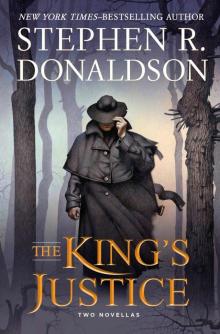 The King's Justice: Two Novellas
The King's Justice: Two Novellas The Wounded Land
The Wounded Land The Runes of the Earth
The Runes of the Earth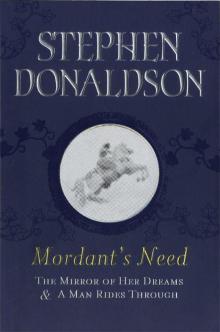 Mordant's Need
Mordant's Need The One Tree
The One Tree Gilden-Fire
Gilden-Fire Reave the Just and Other Tales
Reave the Just and Other Tales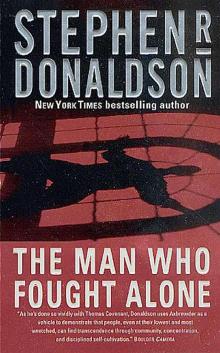 The Man Who Fought Alone
The Man Who Fought Alone The Last Dark
The Last Dark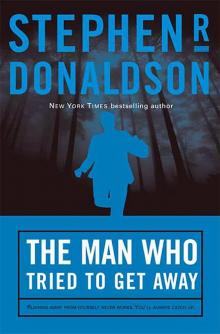 The Man Who Tried to Get Away
The Man Who Tried to Get Away Thomas Covenant 02: The Illearth War
Thomas Covenant 02: The Illearth War A Dark and Hungry God Arises
A Dark and Hungry God Arises The One Tree t2cotc-2
The One Tree t2cotc-2 Lord Foul's Bane cotc-1
Lord Foul's Bane cotc-1 The Illearth War t1cotc-2
The Illearth War t1cotc-2 The Runes of the Earth: The Last Chronicles of Thomas Covenant - Book One
The Runes of the Earth: The Last Chronicles of Thomas Covenant - Book One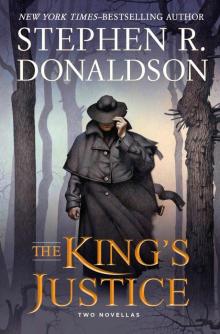 The King's Justice
The King's Justice White Gold Wielder t2cotc-3
White Gold Wielder t2cotc-3 The Power That Preserves t1cotc-3
The Power That Preserves t1cotc-3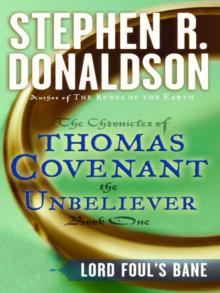 Thomas Covenant 01: Lord Foul's Bane
Thomas Covenant 01: Lord Foul's Bane Chaos and Order: The Gap Into Madness
Chaos and Order: The Gap Into Madness Daughter of Regals
Daughter of Regals Forbidden Knowledge: The Gap Into Vision
Forbidden Knowledge: The Gap Into Vision Fatal Revenant t3cotc-2
Fatal Revenant t3cotc-2 The Runes of the Earth t3cotc-1
The Runes of the Earth t3cotc-1 Thomas Covenant 03: Power That Preserves
Thomas Covenant 03: Power That Preserves This Day all Gods Die: The Gap into Ruin
This Day all Gods Die: The Gap into Ruin The Wounded Land t2cotc-1
The Wounded Land t2cotc-1 This Day All Gods Die
This Day All Gods Die One Tree
One Tree